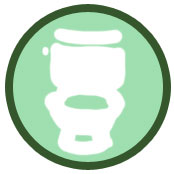by Stacey
Lots of good stuff from the November issue of the Journal Pediatrics.
Let’s start with the babies. One new study called Are We Overprescribing Antireflux Medications for Infants With Regurgitation? shows that babies who are treated with drugs for gastroesophageal reflux disease, or GERD, may not actually need the medication. According to the study abstract, “The majority of infants who were prescribed antireflux drugs did not meet diagnostic criteria.”
Researchers conducted esophageal pH monitoring (measuring the reflux or regurgitation of acid from the stomach into the esophagus) of 44 infants in a New Orleans medical center. Each of the children had persistent regurgitation. The study showed that while only eight of the infants had abnormal pH levels indicating GERD, 42 of 44 infants were on antireflux medication. When medication was withdrawn from the infants who did not meet GERD criteria, reflux symptoms did not worsen.
My son Sage was a “persistent regurgitator” as an infant. Oh, he regurgitated all over the place. On me, on himself, on the floor, on the furniture, on the airplane, you get my drift. It was a mess. Our pediatrician diagnosed him with reflux, but since it wasn’t the painful kind, he didn’t mention anything about treating him. I’m glad too, because what did I know? Probably if he had told me that Sage needed medicine for his constant barfing I would have given it to him. Do no harm, doctors, do no harm.
Now on to the little guys. Another study called, Early Violent Television Viewing Associated with Later Anti-Social Behavior, found a link between violent television viewing by preschool boys (ages 2 to 5) with antisocial behavior at ages 7 to nine.
According to the study abstract, researchers reviewed data from the Panel Study of Income Dynamics (a nearly 40-year study of 8,000 U.S. families) on 184 boys and 146 girls. The data review found a link between pre-school-age boys watching violent programming and antisocial behavior at ages 7 to 9. There was no link found between non-violent television viewing and antisocial behavior in boys or girls, or violent programming and anti-social behavior in girls. The study authors say the findings are significant as early childhood aggressive behavior is often a predictor of violent behavior in youth and adolescents.
I couldn’t make my way online to the full text of the article so I’m not sure what violent TV means or what defines antisocial behavior. Neither sound good. Sage doesn’t watch “tough movies” as he calls them. But his imaginary friend Hippy does. According to Sage, Hippy likes “the punching kind.” Yikes. I just hope Hippy’s parents are prepared to deal with the fallout.
And finally, a new study entitled Shorter Sleep Duration Is Associated With Increased Risk for Being Overweight at Ages 9 to 12 Years, found that kids this age who did not get enough sleep were more likely to be overweight by sixth grade. According to the study abstract, shorter sleep duration in 6th grade was independently associated with a greater likelihood of kids being overweight. Shorter sleep duration in 3rd grade was also independently associated with being overweight in 6th grade, independent of the child’s weight status in 3rd grade.
Conversely, for every additional one hour of sleep in 6th grade, a child was 20 percent less likely to be overweight in 6th grade; every additional hour of sleep in 3rd grade resulted in a 40 percent decrease in the child’s risk of being overweight in 6th grade.
For me sleep deprivation translates into energy deprivation which I try to make up for by eating sugar. I can’t believe the sweets I pack away when my kids’ sleep is chronically interrupting my own. Maybe that’s what’s going on. Or maybe the kids in this study were squirreling away boxes of cookies that they ate in the middle of the night by flashlight under the covers. After the insanity I’ve witnessed around here over Halloween candy, I’ll believe anything.




